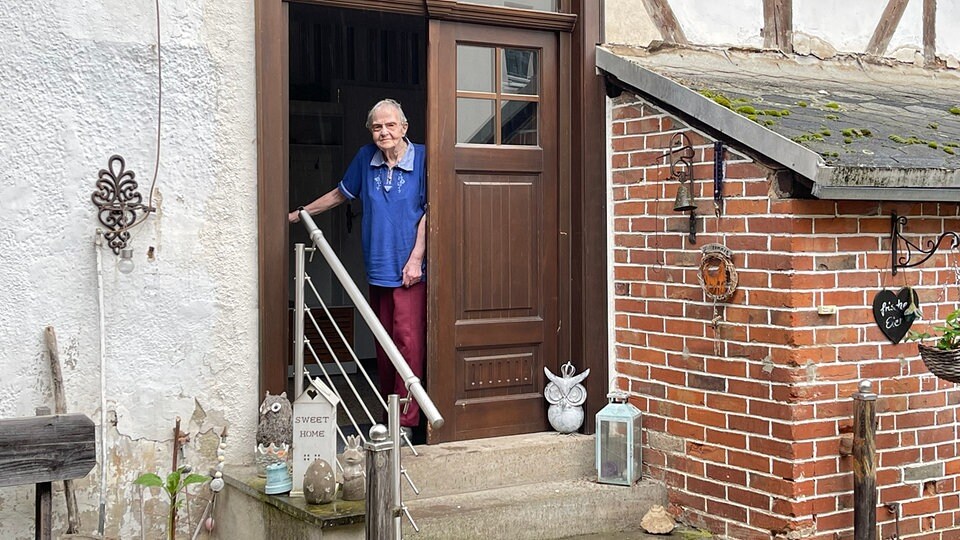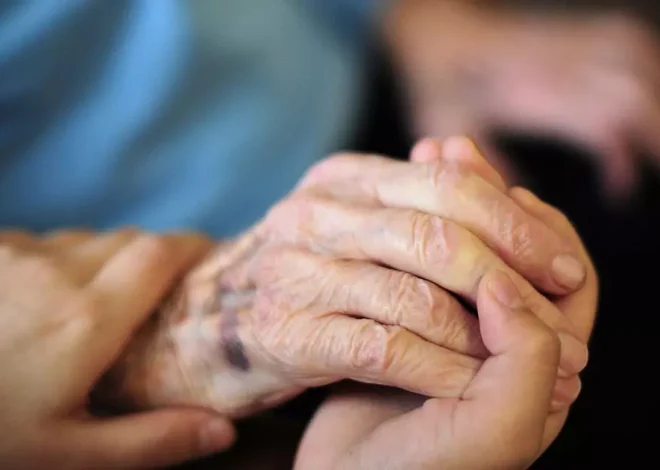
These are the challenges facing families
The number of people in need of care is increasing. A large proportion of older people are cared for at home by family, friends and nursing professionals. Almost every day, relatives have to juggle work and care. In rural areas, there is a particular lack of day and short-term care places. To mark the start of the “Thuringian Week of Caring Relatives”, we accompanied a family from the Ilm district in their daily care routine.
Three generations live under one roof on the Thamm family farm in the small town of Rippersroda in the Ilm district. For several years, the oldest member of the family has been dependent on intensive support and care in everyday life. This daily task can only be managed together and with the help of the outpatient care service. The bureaucracy, the lack of care services in the countryside and the daily balancing act between work and care are particularly challenging.
In Thuringia, around 300,000 people care for their relatives. The number of people in need of care will continue to rise due to demographic change – and the situation will probably become even more serious given the shortage of skilled workers, particularly in rural areas.
Older people dependent on care
Jörg Thamm’s alarm clock rings every day at 6 a.m. Then it’s time to prepare the tablets and breakfast for his almost 90-year-old mother. For about three years, after several operations on her foot, Barbara Thamm has been dependent on intensive support in her daily life and care. Getting up, washing, getting dressed – many movements require helping hands. In addition to the family, an outpatient nursing service looks after the elderly woman.
“Without family support, this wouldn’t work”
The nurses come twice a day and take care of hygiene and lunch. “Since we work and are not there during the day, lunch has to be served,” says Thamm, describing the situation. “We then check in again at coffee time. We are in the house all the time, and the children come in and check on her, open the door and see if everything is OK.”
Without family support, this wouldn’t work.
Jörg Thamm | caring relative
After dinner, the last round always takes place at 10 p.m.: “That means taking off the support stockings, which she can’t do on her own because they are so tight, and then the last tablet is given again.”
Image rights: MDR/Lisa Wudy
Three generations live under one roof with the Thamm family from Rippersroda. Caring for his mother is only possible thanks to the support of his wife and children, says the 58-year-old: “Without the family behind us, it wouldn’t work.” The fact that the mother, who needs care, lives with the family on the farm makes things easier: “If we didn’t have the person to be cared for in the house, it would be more difficult.” The family involved the nursing service from the start, because they couldn’t manage the care alone.
Daily additional burden for caring relatives
In addition to daily care and preparing meals, a lot of time is spent on household chores. Washing clothes, tidying up, cleaning – in addition to your own four walls, the household also has to be taken care of. There are also numerous doctor’s appointments: “Whether it’s to the diabetic doctor, the family doctor, the optician or the ophthalmologist, it’s not easy. I have to pack the walker, wrap up my mother properly and hoist her into the car,” says the trained gardener. In order for the family to be able to make it to the appointments, work often has to be interrupted, shifts have to be postponed or extra vacation has to be taken.
Image rights: MDR/Lisa Wudy
Bureaucratic hurdles
From the classification of the level of care, to the billing of respite care, to the procurement of care supplies – it is complicated, time-consuming and at the beginning, caring relatives are often overwhelmed by the many forms. “It’s working now, but you have to be very careful at the beginning and really work hard to overcome all these hurdles,” says Thamm. The entire bureaucracy associated with care is demanding and should be simplified, according to Thamm.
Nursing service: difficulties in rural areas
The almost 90-year-old is cared for by the outpatient nursing service of the Arnstadt DRK district association. The nursing staff also look after four other senior citizens from the village. A few months ago, their care was taken over entirely by the DRK. Another provider had withdrawn from the region due to a lack of staff, says deputy nursing service manager Ellen Plumeier.
Anything further out into the village is where things get difficult. The supply situation will not improve in the future either.
Ellen Plumeier | Deputy Head of Nursing
Fortunately, it was possible to take on all those in need of care. Nursing services in rural areas are becoming increasingly difficult: “Anything that goes further out into the villages is difficult. The care will not improve in the future.” In some areas of the district, there is already a lack of services. “The relatives are basically on their own. This also applies to day care. And then there has to be a free place. There needs to be more services on offer,” says the 39-year-old nursing professional.
Day care is not an option in the village
Day care, in which those affected are cared for in a facility for several hours a day, often relieves the burden on the caring relatives and brings variety to the everyday life of the elderly in need of care. But in Rippersroda, there is no such offer. “It is difficult to organize. I have asked in Arnstadt, Gräfenroda and Geraberg.
It was not an option to generate a day care facility that would say: Yes, we’ll drive to Rippersroda and pick them up. Unfortunately, that’s the way it is,” says Thamm. The journey to the village is too far for day care. “The reimbursement for transporting the people in need of care from the state and the federal government is simply too low. That is why the further away you live, the worse your chances of attending day care,” says Thamm, who has also had this experience reflected by fellow citizens as a local politician.
“Relatives perform a logistical masterpiece”
Especially in rural areas, caring relatives face great challenges due to the longer journeys, says Christiane Herrmann from the municipal senior citizens and care information center in the Ilm district. A lack of day care is a problem, she confirms: “I can understand the day care facilities to a certain extent, they are simply not fully financed. The travel allowances do not cover the services that are actually provided. So it is simply not included in the list of services for the relatives, or for the senior citizens.” This is in addition to the costs.
With a care level of two, those affected could afford day care for two days without additional payment, although the need might be greater. In addition, there are far too few short-term care options in the region. The individual problems are complex. The relatives perform a logistical feat every day to manage the care. For Christiane Herrmann, one thing is clear: there is a lack of support for caring relatives.
The state of Thuringia is currently working with stakeholders in the nursing and health sector in a dialogue workshop to develop solutions for the diverse challenges in nursing. Among other things, a Thuringian nursing network is to be established to provide targeted support to those in need of care and their caring relatives. The results will also be incorporated into the Thuringian nursing development plan, which, according to the Ministry of Health, is to be completed next year.
More on the topic of caring for relatives
This topic in the program:MDR THÜRINGEN – The Radio | The conclusion of the day | June 3, 2024 | 6:25 p.m.
Show all
Show all

Ethel Purdy – Medical Blogger & Pharmacist
Bridging the world of wellness and science, Ethel Purdy is a professional voice in healthcare with a passion for sharing knowledge. At 36, she stands at the confluence of medical expertise and the written word, holding a pharmacy degree acquired under the rigorous education systems of Germany and Estonia.
Her pursuit of medicine was fueled by a desire to understand the intricacies of human health and to contribute to the community’s understanding of it. Transitioning seamlessly into the realm of blogging, Ethel has found a platform to demystify complex medical concepts for the everyday reader.
Ethel’s commitment to the world of medicine extends beyond her professional life into a personal commitment to health and wellness. Her hobbies reflect this dedication, often involving research on the latest medical advances, participating in wellness communities, and exploring the vast and varied dimensions of health.
Join Ethel as she distills her pharmaceutical knowledge into accessible wisdom, fostering an environment where science meets lifestyle and everyone is invited to learn. Whether you’re looking for insights into the latest health trends or trustworthy medical advice, Ethel’s blog is your gateway to the nexus of healthcare and daily living.



